Our next interview in the series takes us to the door of Quartz Reef winemaker and two-time recipient of New Zealand Winemaker of the Year, Rudi Bauer.
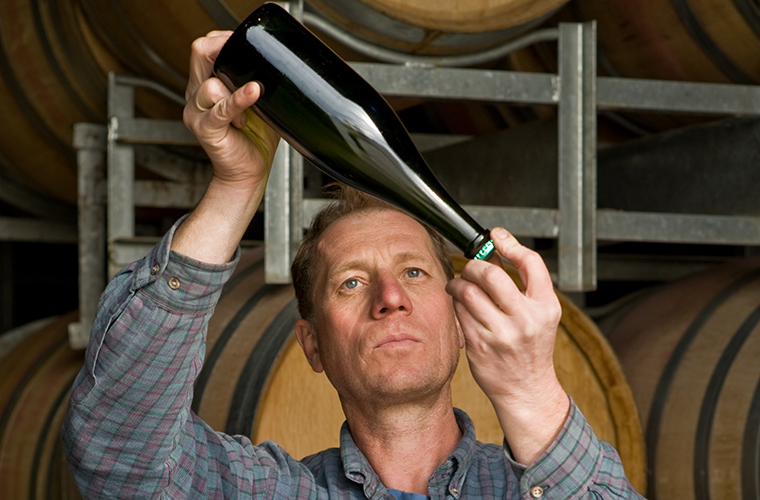
Hailing from Salzburg, a beautiful city in Austria that I visited as a young man, Rudi Bauer is the winemaker at Quartz Reef winery in Central Otago. Coming to New Zealand on a 6 month working visa in 1985 proved to be a turning point in this young man’s life… becoming enamoured with the country, and staying on to work at Mission Vineyard in Hawkes Bay until 1989. That was before a stint in Oregon gave him the Pinot Noir bug and he moved to Central Otago to make the region’s first gold, and trophy, Pinot Noir at Rippon Vineyard in 1991. In 1996, at Bendigo, Rudi created Quartz Reef; specialising in Pinot Noir, Pinot Gris and Méthode Traditionnelle. I consider him one of the founders of New Zealand’s modern winemaking industry and it was a delight to catch up with him at his Winery headquarters recently.
WineFolio – first – a question I’m asking all the winemakers I’m talking with: Is winemaking a Science or an Art?
Rudi Bauer: When you ask me why am I a winemaker – the main reason is because wine is a media for communication. That’s all that it is, and that’s why I am a winemaker. Coming back to your question – it’s always a combination of science and the artistic approach. Because you’ve got something, like a grape, and you turn it into something else.
Which is not me – because it’s the yeast doing that. The grapes, the land, the variety and so on. So really if you look at it from that point of view, I would consider myself as a vine shepherd and a barrel nurse!
And when you are talking about the artistic approach – if you call it art… because you are able to read the season well and make something exceptional and distinctive in your glass… then I would say yes. But, really? I always ask myself the same question.
WF: And if you look at NZ wine, and how it’s got so good, quite quickly…compared to the history of years of winemaking in Europe for example. Why do you think that is?
RB: New Zealand winemakers are, generally speaking, extremely technically-trained but philosophically they have no idea. So if you go to Europe you would see the philosophy where wine is part of life, part of culture. And science, knowledge was important but what was more important was that you are connecting the land to bring into your glass. So, in New Zealand, and in particular this enormous jackpot of Sauvignon Blanc where you have extremely skilled winemakers who are able to make a wine which is absolutely varietally expressive, and because it is Marlborough.. and it’s a stunning combination. But when you talk about wine in New Zealand they come up with these terms ‘this is gooseberry, this is strawberry and god knows what..’ That’s modern education, and because of the science, and in terms of ’how do you describe it’? But in Europe it’s a poetic language – a completely different language. They have different metaphors.
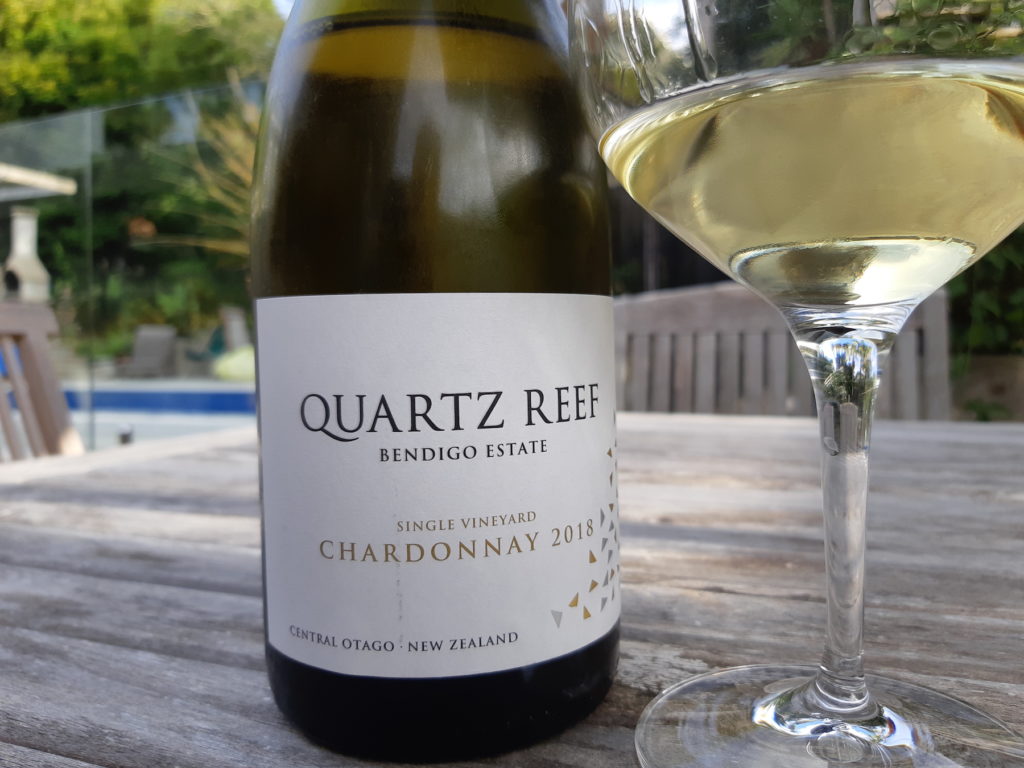
With Michael Brajkovich, in 1985 he brought out Chardonnays and they were thrown out of the New Zealand Wine Awards because people said it’s faulty. So he was one of the early ones to realise that yes it’s great to make Chardonnay, but it’s even greater to bring in the added aspect of yeast – wild ferment. He was one of the early pioneers, like his father Mate who was a legend in his own right. Now you see in the last ten years, far more expression, where you try to play with the land, but also you try to make the variety of more interest than just a really highly entertaining action movie. Getting more and more depth. So this is a great phase now – particularly when you look at the evolution of Pinot – our Pinots in our region. Because we, as a region, are extremely young; but also there’s a massive amount of information that we’re getting extremely quickly. So, to me, New Zealand modern wine began in 1985, but so much has been achieved in that time. And so much still to come. I find this quite extraordinary. And Central Otago is a small enough region that you can still see what’s going on, and look at the great examples coming through, and the experiments going on.
WF: It’s a very exciting phase of NZ wine.
RB: Yes, and we do remember the legendary wines like the Coleraine of ’82, and the Pinot from Danny Schuster, and we go back to Nobilos Pinots, the ’68 and ’69 Cabernets from McWilliams – there have been historic wines. And Sauvignon Blanc of course.
WF: I was talking to Kumeu River about their Cremant, and how they had discussed it with you when they were making it. I do think another thing that is potentially exciting for New Zealand is sparkling wine.
RB: It’s very interesting, you get such a big surprise there’s only a few who are specialising or committed to sparkling wine. If you find ten wineries, you are lucky.
WF: Except we won’t have that magic word of Champagne on the bottle – is that a stumbling block?
RB: The answer is yes, it always will be, because they are extraordinarily clever. And rightly so – they protect it. But from a New Zealand point of view, and our sparkling wine is the strongest in New Zealand – when you go to export it, you not only run into Champagne, you run into other sparkling wines (Australian wines), so it makes it more difficult. What I have learnt so far is that New Zealand is gaining confidence that you don’t have to have champagne in order to celebrate. With something from New Zealand you can achieve the same thing. Not to mention that the price point is better. There is also now a prestige. And it has one role – to help someone celebrate something.
WF: I see a time when it won’t be an issue – maybe not in our lifetimes. But when brands can develop and be seen as an equal to Champagne.
RB: I think New Zealand has already proven that. If you look at International Wine Awards and press, they can happily hold their own. The New Zealand palate they feel far more comfortable with fresher and brighter sparkling wines than in Champagne itself. So you give them a blind tasting they will always go for New Zealand.
Which is interesting because when we taste good Champagne, there’s so much reserve wine in them, it always tastes too aged. They see this as something special because it’s complex – but we see it as ‘it’s not as fresh as I’d hoped’. Our way to look at wines is that they are bright, with beautiful fruit. There’s no way with Champagne – they can’t do that. But the interesting part is that I think you might be right – when New Zealanders adjust to the NZ version of Champagne, then there will be less focus on Champagne?
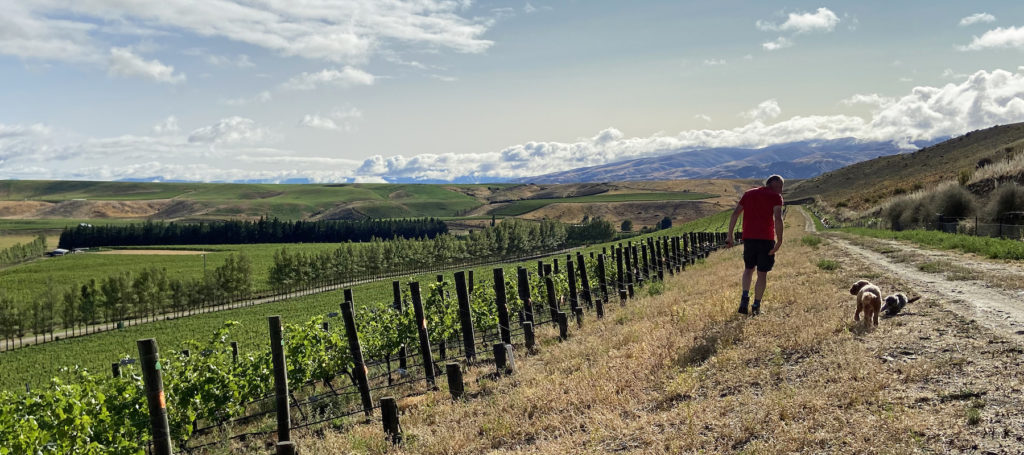
WF: New Zealand is also quite a ‘young’ nation – we are still developing, and I think our wine is starting to show that – it is ‘growing up’
RB: Something that is quite important is that because NZ is an English colony, New Zealand wine is not integrated in our heritage and our culture. If we had been a French colony, then it goes without saying? It means that the government itself has not recognised that it is another part of our ‘growing up’ as New Zealanders. Wine is part of that evolution. So they still see wine as something which is a good tax income, but not seeing wine as a positive part of our society.
WF: But that’s because ‘culture’ is undervalued in New Zealand in general. Arts is undervalued. If you spoke to someone and said “Who is the greatest New Zealander?’ – they quote a rugby player, or an Olympic medal winner, They wouldn’t say a poet, an artist, a singer, a winemaker – they wouldn’t think of that as ‘good enough’.
RB: So how then do you see the future of that? Because wine is part of that.
WF: I think it’s part of growing up. When you were a child, your hero was a sportsman. But as you became an adult maybe it changed to be a musician, or an actor. It’s developing.
RB: So, we are a teenage nation – what does that mean? Will it be our children?
WF: I think so – the future generations. Maybe women are the future for NZ wine? There seem to be plenty of women working in wine and making great wine here.
RB: What will we do then? I’m not worried about us, but I look at our children and think for a young male, it’s highly difficult now to integrate in society, because you don’t know what to do.
WF: I don’t have the answers there I’m afraid!
WF: And, also, what about Climate Change? Do you think wine will always be in bottles for example?
RB: No. Because one day there will be no glass. And you talk to people about it and they look at you! But coming back to Climate Change and I find it quite interesting that we think ‘now we change, and the planet will go back to normal’. No-one wants the truth that it will take at least 50 years. However, if you let that cat out of the bag, then people will say “oh stuff it..”
They did a study in Austria about it and basically people’s whole concept in thinking about climate change, is that it’s too big to swallow. The government has the best chance to do things because then it will happen. We have small communities but without support from politicians you won’t have a movement..
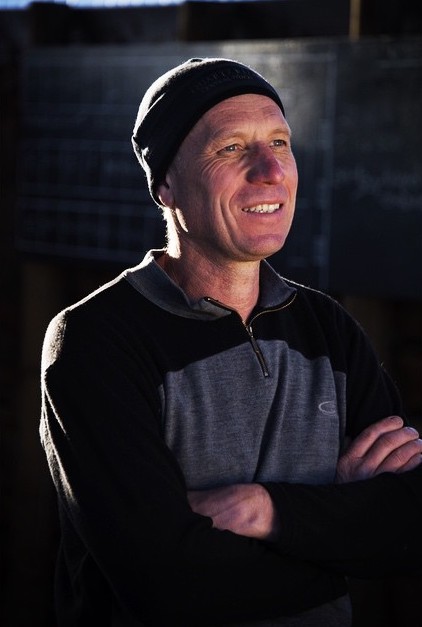
WF: Backtracking to winemaking for a moment – do you have plans for what’s next? Something new that you’re doing?
RB: For me it’s more important to get a better understanding of the vineyard, and improve things that I didn’t know 20 years ago. For example, you set certain things up at that time because you didn’t have the knowledge or technology, and now you can upgrade.
I do believe technology is an important part of growing wine and that’s a good thing. Getting to a point where the vines, soil and land have a good relationship. And then, from a winemaking point of view, I would love to have natural fermentation of the sparkling wine – in the bottle. And already you can imagine that is sitting on a timebomb, because everybody bottle literally would taste different. And can you afford it – no! Should you try it – yes!
WF: Is there a point during the process where you get ‘a feeling’?
RB: The answer is, it comes at various points. In the vineyard is first. You think ‘I’ll keep an eye on you’ and already you start to get the picture of what could maybe happen. Then the role you play in the winemaking itself – whole bunches, or oak and these scenarios. You also go through the phase where you say ‘oh shit, that doesn’t taste any good at all’ That’s a very important reality check. And then you see some ferments and you already like them. Interesting part for me is always with Pinot Gris – it’s quite nerve-wracking because sometimes it tends to ferment for up to ten months! And you wonder what’s the threshold between self-centred ambitions and your reality to the customer.
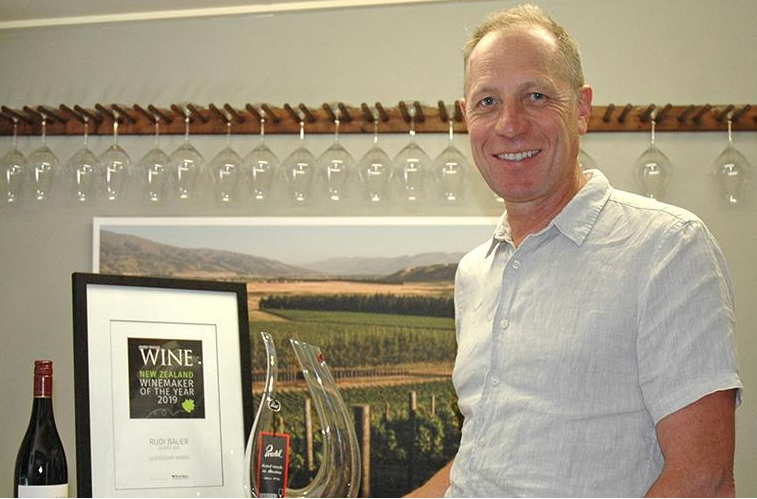
WF: Do you have any ambitions for your products? Do you look for recognition and gold medals?
RB: The answer is yes. To get recognition for something is something you aspire to. And the question is how you deal with recognition – how you take it on board and reflect it. You can use this as a vehicle to promote biodynamics, because you already got the credentials.
A classic example happened just two weeks ago – because of the recognition we have got with our wine, I was asked to be on the Central Otago Tourism Advisory Board. I think Central Otago now has the chance to be a leader in looking after your land. And now a job is to find out how this can be integrated in our community and build on that. And Wine Tourism is quite a big part of it – Central Otago Tourism are very keen to work on that.

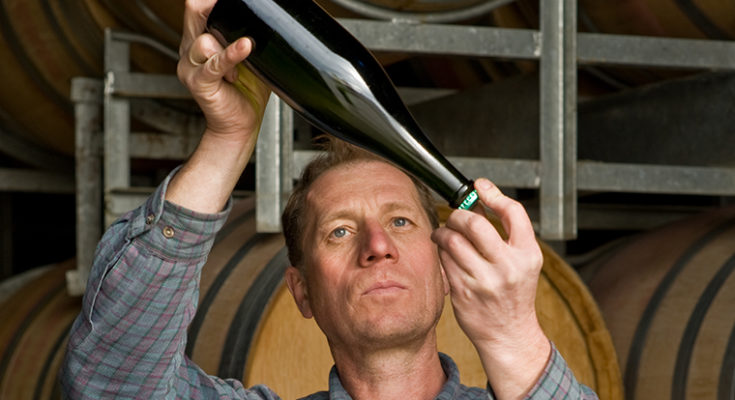
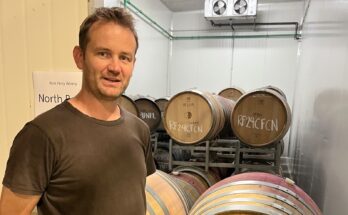
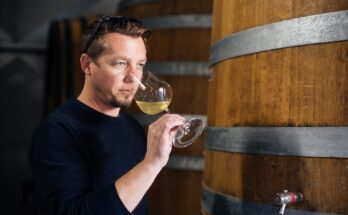

2 Comments on “Winemaker series: Rudi Bauer”